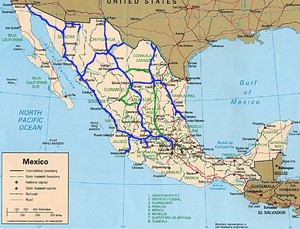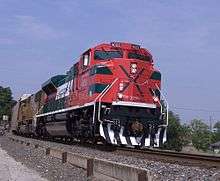Ferromex
|
| |
 | |
| Reporting mark | FXE |
|---|---|
| Locale | Mexico |
| Dates of operation | 1998–present |
| Track gauge | 4 ft 8 1⁄2 in (1,435 mm) standard gauge |
| Headquarters | Mexico City[1] |
Ferromex (reporting mark FXE) (portmanteau of Ferrocarril Mexicano or "Mexican Railway") is a private rail consortium that operates the largest (by mileage) railway in Mexico with combined mileage (Ferromex + Ferrosur) of 7500 miles (12070 km).
Description


Ferromex began operating on February 19, 1998, following the privatization of most of the government-owned railways by then President of Mexico Ernesto Zedillo Ponce de León. Ferromex operates more than 9,610 kilometers (5,970 mi) of track and interconnects five major inland Mexican cities, five cities along the border with the United States, four seaports on the Pacific Ocean and one more on the Gulf of Mexico. Currently, Grupo Mexico owns 74% and Union Pacific Corporation owns 26% of the company. The Ferromex System operates 9610 km of Ferromex tracks plus 2654 km of Ferrosur tracks.
Protest Incident
In 2014 Ferromex locomotive No. 4041 was the lead locomotive for a freight train being operated in Mexico and was had stopped near an at-grade road crossing because a group of protesters was blocking the track with tables, chairs, and banners. The engineer waited for the protesters to clear the tracks before continuing. When the protesters did not clear the track, the engineer ended up operating the train through the crossing, crushing tables and chairs in the process. No one was harmed during the incident. The incident can be viewed in its entirety on Youtube.
Passenger services
Ferromex hosts the Ferrocarril Chihuahua al Pacífico "ChePe" railroad, a tourist line that runs through the Copper Canyon. Ferromex also operates the Tequila Express, which runs from Guadalajara, Jalisco to a tequila distillery in Amatitán, Jalisco.
Merger with Ferrosur
In November 2005, Grupo México, owner of Ferromex purchased Infraestructura y Transportes Ferroviarios, the parent company of Ferrosur, another of Mexico's Class I railroads, in a US$309 million stock transaction.[2][3] The Mexican Federal Competition Commission (CFC) had rejected a proposed 2002 merger of Ferromex and Ferrosur amid opposition from Ferromex competitor, Grupo Transportación Ferroviaria Mexicana (TFM).[4]
Following the November 2005 purchase of Ferrosur by Grupo México, Kansas City Southern de México (KCSM), successor to TFM, petitioned the Mexican government to block the merger of Ferrosur and Ferromex. The CFC rejected the merger in June 2006 stating that the merger would have led to excessive concentration in the railway industry to the detriment of consumers and competing shippers.[5] However, in March 2011, a tribunal ruled in Grupo México's favor, and the merger was permitted.[6]
Rolling stock
In January 2011, Ferromex ordered 44 locomotives from EMD, its first order since 2006.[7]
See also
References
- ↑ "Grupo México, About us, Offices". Archived from the original on December 5, 2008. Retrieved 2009-03-02.
- ↑ FWN Select, "Grupo Mexico Buys Ferrosur Railway From Carso" (Nov. 25, 2005)
- ↑ "Abandonments & Acquisitions". Trains Magazine. Vol. 66 no. 3. March 2006. p. 15. ISSN 0041-0934.
- ↑ FWN Select, "Mexico's Antitrust Agency To Study Railway Merger" (Nov. 28, 2005)
- ↑ FWN Select, "Mexico's Antitrust Commission Rejects Rail Merger Appeal" (Nov. 15, 2006)
- ↑ "Mexican Tribunal OKs Grupo Mexico Railroad merger". Reuters. 2011-03-28.
- ↑ "Railway Gazette: EMD wins two SD70ACe orders". Retrieved 2011-02-13.
External links
| Wikimedia Commons has media related to Ferromex. |
- Ferromex Web site (in Spanish)
- MEXLIST—The Group for Mexican Railway Information
- Youtube: Ferromex #4041 Protester Incident Video